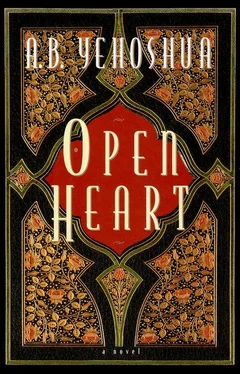A. Yehoshua - Open Heart
Здесь есть возможность читать онлайн «A. Yehoshua - Open Heart» весь текст электронной книги совершенно бесплатно (целиком полную версию без сокращений). В некоторых случаях можно слушать аудио, скачать через торрент в формате fb2 и присутствует краткое содержание. Год выпуска: 2014, Издательство: Peter Halban, Жанр: Современная проза, на английском языке. Описание произведения, (предисловие) а так же отзывы посетителей доступны на портале библиотеки ЛибКат.
- Название:Open Heart
- Автор:
- Издательство:Peter Halban
- Жанр:
- Год:2014
- ISBN:нет данных
- Рейтинг книги:3 / 5. Голосов: 1
-
Избранное:Добавить в избранное
- Отзывы:
-
Ваша оценка:
- 60
- 1
- 2
- 3
- 4
- 5
Open Heart: краткое содержание, описание и аннотация
Предлагаем к чтению аннотацию, описание, краткое содержание или предисловие (зависит от того, что написал сам автор книги «Open Heart»). Если вы не нашли необходимую информацию о книге — напишите в комментариях, мы постараемся отыскать её.
Open Heart — читать онлайн бесплатно полную книгу (весь текст) целиком
Ниже представлен текст книги, разбитый по страницам. Система сохранения места последней прочитанной страницы, позволяет с удобством читать онлайн бесплатно книгу «Open Heart», без необходимости каждый раз заново искать на чём Вы остановились. Поставьте закладку, и сможете в любой момент перейти на страницу, на которой закончили чтение.
Интервал:
Закладка:
He also did not want to hear my diagnosis, but calmly took his leave of Lazar and of me and went home, switching off the light behind him with his usual economy and casting the entire wing into gloom. I decided not to change my clothes but to hurry as I was to the emergency room, not only because my shift had already begun but also because I was sure that somebody there would be able to tell me what had happened. But the two young surgeons I found there, who had been with Hishin and Levine and the others when they tried to resuscitate Lazar, were still so stunned and upset that despite their eagerness to explain and interpret everything, as eager young doctors will, it was difficult to get a clear picture from them. All I learned was that after Lazar had been declared dead, Levine and Hishin had rushed off to treat Einat, who went into shock when she heard of her father’s death. At first they had wanted to co-opt me to join the delegation bearing the bad news to his wife, but since I was still busy in the operating room, they had called on Lazar’s secretary instead, who went into hysterics and began to scream and cry. Again, unlike the usual practice, the young doctors did not try to blame anyone. Not even Levine, who had been with Lazar when the fibrillation began. Nobody could have expected it — only two hours before an EKG had yielded completely normal results. Arrhythmia was characteristically elusive — it came and went as it pleased. I decided to keep my peace, since nobody could possibly know just how deep my ties with the Lazars went, and I busied myself with the work of the emergency room, which was particularly intensive, with the knowledge of the death of the hospital director breaking over us in wave after stunning wave as we worked into the night. At two A.M., I was called to the surgical wing to assist with a local anesthesia. As soon as it was over I went into the little instrument-packed room again, as if to be certain that the body had indeed been transferred to the hospital morgue, where I had for some reason never been before.
“How do you get there?” I asked the man at the information desk in the entrance lobby, who told me what I wanted to know but insisted that at this hour of night the place was locked and there was nobody there. “Don’t talk nonsense,” I said angrily, “people die at night too,” and I went down to the basement. On the stairs I met three doctors, whom I immediately recognized as Dr. Amit, deputy head of cardiothoracic surgery, Dr. Yarden, the anesthetist who had taken part in Lazar’s operation, and the elderly pathologist Dr. Hefetz. I knew that they were coming from the place that I was going to. To my surprise, they not only recognized me but did not seem surprised to see me there, as if it were only natural that I should be going down to the morgue at two in the morning. “Were you there when it happened?” they asked immediately, as if looking for someone to blame. “No,” I said, “but ever since the operation I haven’t been able to stop thinking about the possibility of ventricular tachycardia.” Dr. Amit shook his head. He didn’t agree with me; perhaps the immediate cause of death had been the arrhythmia, but he suspected that the deterioration in Lazar’s condition stemmed from an infarct caused by an occlusion in one of the bypasses. All three of them seemed very depressed by what had happened. “This death won’t do the reputation of our hospital any good,” pronounced Dr. Hefetz, who agreed to come down with me and show me the body. “But there isn’t much left to see,” he warned me as he turned back down the stairs — for Lazar, like the rest of us, had donated his organs to the hospital research laboratories. It seemed strange to me that the pathologist agreed without any hesitation to my request, as if he, too, understood that I had some special rights here. Had he heard about the trip to India? He opened the door leading to the two adjoining basement rooms. In one of the corners stood a large refrigerator with rows of big iron drawers. He pulled one of them out. I saw a smaller, shrunken Lazar, crudely stitched up after the removal of his internal organs. “Did they take his heart too?” I asked. “Of course not,” Dr. Hefetz answered in surprise.
I suddenly felt calm and wide awake. I knew that I shouldn’t wake my parents at this hour of the night, but I felt that I had to share my feelings with them. I called them up and told them about Lazar’s sudden death. Like all kindhearted people on such occasions, they were shocked and saddened. Again and again they wanted to know how and why it had happened, as if from their home in Jerusalem they could understand what important professors at the hospital like Hishin and Levine had failed to understand. Suddenly I wanted to console them and tell them not to grieve, for Lazar’s soul had already been reincarnated in me, but I knew that they would think my sorrow had driven me out of my mind, and so I only asked them for my aunt’s telephone number in Glasgow so I could get in touch with Michaela. I took a beeper from the emergency room, switched it on, and stole into the administrative wing, which I was sure that the secretary had forgotten to lock up in the commotion. I was right. The door to Lazar’s office was open, and I didn’t even have to put on the light, because there was enough moonlight for me to see the numbers on the telephone. I found Michaela and Stephanie with my family in Scotland. I told Michaela about Lazar’s sudden death and asked her to cut her trip short and come home. There was a silence on the other side of the line. “Look,” I said aggressively, “I know you’re entitled to another week in Britain, but it wouldn’t be right to leave me to cope with the baby alone now in the new situation that’s arisen.”
“What situation are you talking about?” asked Michaela in surprise. For a moment I was angry that she couldn’t understand by herself, but I tried to stay cool. “I’m asking you, Michaela.” I spoke quietly but firmly. “It’s not only Shivi who needs you; I need you too. You’re the only one I can talk to about what’s happening to me. Because nobody else would believe that Lazar’s soul has entered my body.” There was a profound silence on the other end of the line again. But it was no longer the silence of resistance. It was a new, different silence. And I knew that what I had just told her would capture her imagination and excite her curiosity so much that she would cancel her trip to Skye and fly home.
Part Four. Love
Sixteen
Twice during the week of mourning I paid a condolence call to the Lazars’. The first time alone, the day after the funeral, and the second time with Michaela, who returned to the country four days after our midnight telephone conversation. I might have paid a third visit, with my parents, who vacillated between going to the funeral and paying a condolence call until I persuaded them that their relations with the Lazars did not justify either of these measures and it would be enough to send a sympathy letter, which I helped them formulate over the phone. So that I could perform the overt and covert duties imposed on me by Lazar’s sudden death, I asked my parents to keep Shiva with them until Michaela arrived. The overt duties were clearer than the covert ones, and involved the funeral itself, which was scheduled for the day after his death so the hospital administration and his many friends there could organize a dignified ceremony and try to rehabilitate the hospital’s reputation in the wake of damaging rumors about a failed operation and an incorrect diagnosis. I myself was careful at first to maintain medical confidentiality, precisely because I felt that I would be a more reliable source of information than Professor Levine, who was so stunned and grief-stricken by the death of his friend, which had taken place not only in his department but under his personal care, that he retired into a corner and delegated some of his authority to his deputy as a kind of private punishment for himself. In this way he succeeded in diverting most of the darts of criticism from himself to Professor Hishin, who had “stolen” the operation from cardiothoracic surgery and brought in an expert from another hospital. True, patients occasionally died after bypass surgery in the cardiothoracic surgery department too, but these were considered “internal” deaths, while Lazar’s was “external,” brought from outside in an act of treachery. Since I was still convinced that the cause of Lazar’s death was not connected to the surgery but stemmed from a mistaken diagnosis, when the criticism intensified I felt I had to break my silence and defend Professor Hishin from his detractors in the hospital, among them people I hardly knew — physicians, nurses, and members of the administrative staff — who began buttonholing me in the corridor the day after Lazar’s death and questioning me about what had really happened. Dr. Nakash, who happened in on one of these corridor conversations, immediately took me aside and warned me, with uncharacteristic sharpness, to stop letting my mouth run away with me. At the funeral too, which began in the plaza in front of the hospital, I sensed that he and his wife were deliberately keeping close to me and discreetly trying to prevent me from joining the inner circle of mourners, family and intimate friends now surrounding Dori, who was standing at a careful and fearful distance from her beloved husband.
Читать дальшеИнтервал:
Закладка:
Похожие книги на «Open Heart»
Представляем Вашему вниманию похожие книги на «Open Heart» списком для выбора. Мы отобрали схожую по названию и смыслу литературу в надежде предоставить читателям больше вариантов отыскать новые, интересные, ещё непрочитанные произведения.
Обсуждение, отзывы о книге «Open Heart» и просто собственные мнения читателей. Оставьте ваши комментарии, напишите, что Вы думаете о произведении, его смысле или главных героях. Укажите что конкретно понравилось, а что нет, и почему Вы так считаете.












